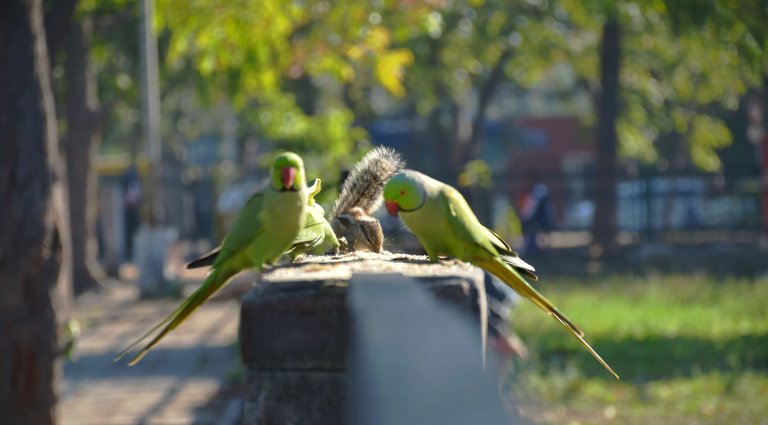
Photo by Yadwinder Singh on Unsplash
with early rose winged parakeets,
as dawn traffic hums.


One of my favorite things to do when visiting new cities is to search for the interplay between nature and the world of humankind. Finding these moments, as that the photographer did in the picture prompt, is like finding hidden gems in between the cracks of the pavement.
It also serves as a great meditative practice as the simpler interplay of animal behaviors can pull you out of your mind, pull you into a state of pure observance, forgetting thought and just living through the feeding city wildlife.
In a way these moments of observing nature in a manmade habitat are a metaphor for the act of writing, particularly writing poetry. The process of composing poems is like picking out nuggets of truth from a landslide of chaotic moments. Sifting through the cacophony of opinion and artificial concern to find what seeds the soul, the glimmering payload at the bottom of the pan.
I think this is why many writers are guarded with their time and space, this is certainly the case for me. It is not that they're unsociable, or disconnected from the world, rather that without distance it is impossible to get a true picture.
“Writers are as jealous as pigeons.”
― Anton Chekhov
Chekhov is right 😂 and I'd extend that metaphor to say that writers have to be like pigeons constantly pecking at everything to find what is edible. Examining ideas, people's conversations, different words to best describe a scene and studying things to find the underlying feeling that they inspire beyond thought.
This is why I've always struggled in a traditional nine to five setting, I'm always jealous of the time that is taken from writing or observing to write.
First world problems eh!🤣
The haiku in this post attempts to capture what Japanese Haiku masters call Mono no aware (物の哀れ):
an empathy with nature and human life; the "feeling of things", nostalgia, regret for the passing of time, understanding of the changeability and of the transience without suffering.
Along with Karumi (軽み):
beauty in simplicity; poetic beauty reflected in its simplicity, free from preconceptions and moral judgment.
This is the final post in a month-long challenge I have set myself to post a daily Haiku on Hive. Each week has had a different theme based on a picture prompt.
This week's broad theme was Reflection on Nature.
I hope you have enjoyed the haiku's and reflections on life.
To read more about the aesthetics of true haiku, and the difference between haiku and senryu, please check out my post: Haiku Vs Senryu - The Aesthetics of Form

I would like to give a big shout-out to @stickupcurator (and @stickupboys) for their amazing contribution to supporting music, art, imaginative writing, and all things creative on hive. If you haven't already, you should go check out their account for music, crypto podcasts and much much more 🙂👍
The picture used in this post is creative commons, linked below pic. If you have enjoyed this Haiku, please check out my homepage @raj808 for similar content. Thank you.




Congratulations @raj808! You have completed the following achievement on the Hive blockchain And have been rewarded with New badge(s)
Your next target is to reach 66000 upvotes.
You can view your badges on your board and compare yourself to others in the Ranking
If you no longer want to receive notifications, reply to this comment with the word
STOPCheck out our last posts: